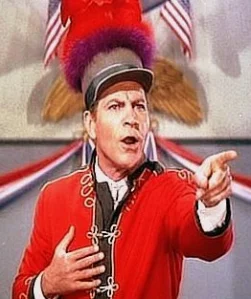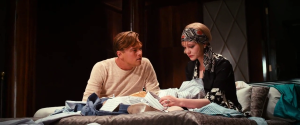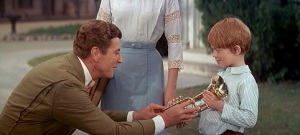
“Remember, my friends, listen to me because I pass this way but once.”
From Meredith Wilson’s Tony-winning musical The Music Man and F. Scott Fitzgerald’s perennially high-school required read The Great Gatsby spring two of the cleverest and most dapper American heroes to feature in our star-spangled tradition. Yet, the word “hero” is clearly a troubled one in these works, for both Hill and Gatsby (if we may even refer to them as such since both monikers are pseudonyms) complicate the water of conventional heroics. Undoubtedly, they enthrall their audiences, luring us all in with their smoke-and-mirrors masquerade. They are truly dazzling figures, quick-witted charlatans with magnetic appeal and magical, theatrical aplomb. Their uncanny ability to wink-and-nod through life, to deflect the truth with a carefully-timed joke, to blur unpleasant realities with enough lights and music (indeed with seventy-six trombones) to encourage the fantasy of the American dream – even if the supports have been lamed decades ago – stuns us, leaving us with just enough patriotic paralysis to miss the haunting possibility that behind the American camouflage lies a hollow and corroded void.

“They’re such beautiful shirts […] It makes me sad because I’ve never seen such beautiful shirts before.”
In this post, then, I’d like to introduce a comparison of both Hill and Gatsby as quintessential American figures, earnest and romantic heroes pursuing illusory and counterfeit means of achieving their dreams. They are pied pipers, whistling and parading the nation in an endless and indefinite march toward ever-receding hopes. Yet, they are not cruel, for they are equally caught up in the cavalcade, spirited themselves by the glittering exuberance of the red, white, and blue. In short, they represent the modern American in desperate need of spiritual redemption and salvation from the treadmill of the American dream.
- Empty Yesterdays
Much of what motivates both Harold Hill and Jay Gatsby in their construction of false identities and flashy theatrics is a settled fear of the wasted life, a molded leaf-pile of regrets and missed opportunities.
As Hill requests to meet Marian Paroo, the reticent, independent town librarian, at the footbridge for a romantic rendezvous, Marian hesitates, asking to postpone the meeting. Hill’s response reveals his fear of losing time: “Oh, my dear little librarian. You pile up enough tomorrows, and you’ll find you are left with nothing but a lot of empty yesterdays. I don’t know about you, but I’d like to make today worth remembering.” Though this romantic gesture may arguably be just an extension of Hill’s crafted persona, I believe this statement embodies Hill’s genuine sentiment, for it arrives at the point in the film where Hill is becoming most vulnerable and most transparent in his affections for Marian. Indeed, he sacrifices his entire industry in falling for her, a choice (or not?) equally true of Gatsby and Daisy.

“Can’t repeat the past? Why of course you can!”
For Gatsby, this fear of a lost past is summed up powerfully in one of his most famous lines spoken to the novel’s narrator Nick Carraway. In his attempt to regain Daisy Buchanan, the love of his life, from her husband Tom, Gatsby seeks to go back in time, to undo all of the damage done to their relationship over the last five years. Yet, Nick attempts to halt Gatsby’s efforts, claiming the rationale that one simply cannot repeat the past, to which Gatsby retorts, “Can’t repeat the past? Why of course you can!” Perhaps nowhere else in American letters is the tormented desire to redeem lost time put more conclusively, for Gatsby’s dream is not Daisy, but an echo of Daisy, a vision of Daisy as she once was, and as she fades further away in time with every passing hour, so must Gatsby’s outstretched hand remain suspended in the air. Hers is the green light always at the other end of the bay, and time, it seems, is the sea upon which we “beat on, boats against the current,” yet are always “borne back ceaselessly into the past.”
2. Promising Tomorrows

“I always think there’s a band, kid.”
The charm and the enduring glory of these characters must arise from their eternal optimism, the genuine hopefulness that lies at the core of their flair and self-confidence. For Harold Hill this attitude is most poignant in his interactions with young Winthrop, Marian’s withdrawn little brother. At one moment, Winthrop, distressed with the revelation that Hill is a fake, asks him if there’s no band either. Hill’s response encapsulates the American notion of tomorrow, that the dreams we believe in are pure even if the steps taken to reach them are faulty. Hill lovingly says, “I always think there’s a band, kid.” This is the distillation of Hill’s entire aim: there is always a noble calling to reach for, some beautiful dream to strive after.
For Gatsby this beautiful dream and his constant expectation of it is described as a gift. Nick says, “If personality is an unbroken series of successful gestures, then there was something gorgeous about him, some heightened sensitivity to the promises of life […] it was an extraordinary gift for hope, a romantic readiness such as I have never found in any other person and which it is not likely I shall ever find again.” Both Hill and Gatsby epitomize this “heightened sensitivity”; they are cognizant of the greatness and grandeur of life even if they are simultaneously beleaguered by the flawed approaches they take toward realizing it. In this way, they reveal the depths of the American experience, twisted by the corruptness of sin yet, as Loki declares, “burdened with glorious purpose.”
All is not lost, however. The so-called gorgeousness of these characters does bear a mark of truth and hopefulness, for the hollowness at the root of these heroes may be restored. While Gatsby is drowned by the overwhelming impossibility of his dream, we must remember that Hill is redeemed by the truth; exposed as the sinful man he is, Hill ends the musical disgraced, yet redeemed. As he tells Marian, he cannot go on as a con man since, for the first time in his life, he “got his foot caught in the door.”
May all our American performances, our daily struggle to maintain the sparkling masks of success, self-reliance, and selfishness, likewise get caught in the door so we may learn to accept our failures and live sacrificially, loving one another in truth.
May all our veils be abandoned that we may finally be human again.
Every post on Edenbabel is a thoughful gold mine, but I especially loved this one. Great insights into some unforgettable characters!
LikeLike
Every post on Edenbabel is a thoughtful gold mine, but I especially loved this one. Great insights into some unforgettable characters!
LikeLiked by 1 person